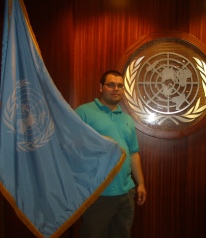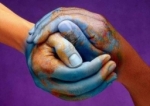Daily Archives: July 16, 2013
Summer 2013: Meet the Interns!
Summer 2013 has started and so have the new interns! Here is a little bit more about each one…
“Ali’s Interns” (Programming)

Me at PAUL Bakery in Prague eating a macaroon, one of my favorite pastries!
Brittany Osachuk
Hi, my name is Brittany Osachuk and I am a fifth year student at Northeastern University studying International Affairs with a minor in Political Science. I am a citizen of the U.S. and Finland and grew up in central Massachusetts but spent time living in Grenada and Finland during my younger years. I have a passion for travelling and experiencing new cultures which has led me to study abroad in the Czech Republic and Japan. In my free time I love to dance hip-hop and am on the No Limits Dance Crew at Northeastern. Fun fact: I can speak Finnish fluently, and yes, it is an uncommon and unusual language! If I could be anyone for a day I would be a KGB spy during the Cold War.
Tim Lawlor
My name is Timothy Jude Lawlor Jr. I am a senior at the University of Massachusetts Lowell (home of real education). I am from Merica, meaning I am American from Irish background. My favorite country is Germany, and my hobbies include outdoors activities and working on my truck. Fun fact – I worked in Germany for a summer at a camp for the Boy Scouts. If I could be anyone for a day, I would be Darius Rucker so I could wagon wheel all the time.

Along with academics at PC, I am also a cheerleader for the men’s and women’s basketball teams, and I enjoy dancing with the dance club and playing intramural soccer.
Cayla Barbour
Hi! My name Cayla and I am a rising junior at Providence College. I am a Raynham, MA native, but both of my parents are from Lebanon making me 100% Lebanese. I love my family’s homeland,but Lebanon is only one of my favorite places to travel. Being a Spanish minor, I love Spain, specifically the city of Granada. I love countries and languages, and that has inspired me to pursue a degree in Global Studies with a double minor in Spanish and Political Science. Along with academics at PC, I am also a cheerleader for the men’s and women’s basketball teams, and I enjoy dancing with the dance club and playing intramural soccer. A fun fact about me is that I can lick my elbow, and if I could be anyone for a day, I would be Kate Middleton (or Catherine, Duchess of Cambridge).

A casual picture of me skydiving recently.
Shuvam Rizal
Hello. My name is Shuvam Rizal and I am a junior at UMass Amherst. I am from Kathmandu in Nepal, but my favorite place is obviously here at UNA-GB building in Boston. Like Tim, I am fan of Darius Rucker’s “Wagon Wheel,” and one of my hobbies is jamming out to it on the guitar every now and then. Fun fact – A large part of me is still very angry at Scar for Mufasa’s death. If I could be anyone for a day, I’d be one of the Beatles, no question!
“Rebecca & Monika’s Interns” (Education)

My hobbies include volunteering at my local church, playing the piano and going out with my friends!
Beatriz Pereira
Hi! My name is Beatriz, and I am currently a sophomore at UMass Boston studying Political Science and International Relations. I am originally from Vitoria, Brazil but I have been living in Boston since 2001. Officially I am Brazilian because I was born in Brazil but I have a crazy mixture of German, Portuguese and Italian because of my parents’ ancestors. If I had to visit one place I would go to Australia, who wouldn’t want to visit the biggest island in the world? I love their accents, their free-spirited style and their way of living. My hobbies include volunteering at my local church, playing the piano and going out with my friends! I would love to be Queen Elizabeth for a day, to just know the feeling of being a queen without the responsibilities. A random fun fact about me is — I am a little obsessed with painting my nails.
Maham Ahmed
Hi, my name is Maham, and I will be a freshman this fall at UMass Amherst! I am from Reading, MA, and I am originally from Pakistan. I love traveling especially to older cities like London, but I am a little biased when it comes to my favorite city as it would have to be Peshawar, Pakistan, the city I was born in. My hobbies include cooking, baking, reading, watching movies, making collages, and photography. I love Thai, Chinese, and Mexican food! A fun fact about me is that I can speak 6 languages (including English). And if I could be anyone for a day I would probably be… Michael Kors or Vera Wang.

If I could choose a person to be for a day, it must be Luxun, a writer who used his pen to fight against darkness and dictators, and his books influenced and inspired many young people at that time.
Wenwen Zhang
My name is Wenwen Zhang, Class 2013 in Wheaton College. I am from an ancient city Shaoxing (China) with 2,500 years’ history. I really want to visit North Korea one day and learn the local cultures and history. I love travelling and photography, and three facts about myself: 1. I cannot swim and am afraid of water; 2. I always mix “kitchen” and “chicken”; 3. I am a big fan of Mayday, a Taiwanese band. If I could choose a person to be for a day, it must be Luxun, a writer who used his pen to fight against darkness and dictators, and his books influenced and inspired many young people at that time. I am really interested in economic development and I would like to work on improving people in developing countries’ living standards in the future.

A fun fact about me is that I won Best Hair in my graduating class and if I could be anyone for a day I’d be James Bond.
Caio Alvim
Hi, my name is Caio and I’m going to be a freshman at Umass Boston in the fall where I’ll be studying Political Science. I was born in the town of Mendes Pimentel in Minas Gerais, Brasil. I’m a native Brasilian of both Italian and Portuguese ancestry. I haven’t traveled enough to have a favorite place picked out in the world but there’s no place I want to get to know more than northern Italy. I love my hometown of Boston and I’m a huge Boston sports fanatic! I love film and acting and I hope to one day pursue my love of acting and become a major Hollywood film star. I also love international relations and might end up choosing to become a diplomat and follow my love of international diplomacy. I love sports, and I was a Division I swimmer in high school and hope to continue swimming in college. A fun fact about me is that I won Best Hair in my graduating class and if I could be anyone for a day I’d be James Bond.
Fun Facts about Ethiopia
 Have an itching desire to visit Ethiopia? Want to know more about the country? Planning on attending Young Professional’s Taste of Ethiopia on Wednesday? Well here are some fun facts about Ethiopia to get you ready and prepared!
Have an itching desire to visit Ethiopia? Want to know more about the country? Planning on attending Young Professional’s Taste of Ethiopia on Wednesday? Well here are some fun facts about Ethiopia to get you ready and prepared!
The Federal Democratic Republic of Ethiopia is a small country located in the Horn of Africa. It is only about double the size of Texas with a population of 84,734,262 and is the second most populous nation in Africa and one of the oldest independent ones in the region. The capital is Addis Ababa, which is also the largest city in the country, and the location of parliament and official buildings. Throughout the past decade, their former prime minister Meles Zenawi has strengthened relations with the US, making Ethiopia one of America’s closest African allies.
 People in Ethiopia generally speak Amharic, which is a Semitic language like Arabic and is considered a sacred language to Rastafarians. The word Rastafarian actually comes from the name of Ethiopian Emperor Haile Selassie (Ras Tafari) who visited Jamaica in 1966 and was generally considered a messianic figure who would bring peace and prosperity in a golden age.
People in Ethiopia generally speak Amharic, which is a Semitic language like Arabic and is considered a sacred language to Rastafarians. The word Rastafarian actually comes from the name of Ethiopian Emperor Haile Selassie (Ras Tafari) who visited Jamaica in 1966 and was generally considered a messianic figure who would bring peace and prosperity in a golden age.
For those of us who love our cup ‘o joe in the morning, we are indebted to Ethiopia as an original birthplace of coffee. Ethiopia is the world’s seventh largest producer of coffee today, and Africa’s top producer. In Ethiopia, as in Arab and Eritrean cultures, there is even a ritualized and ceremonious way of making and drinking coffee.
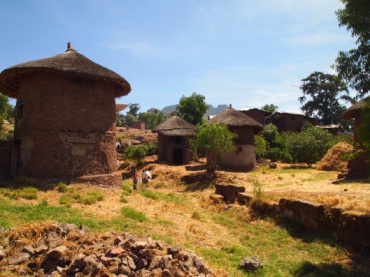 Traditional Ethiopian homes are called Tukul; round huts with dirt floors and walls built with mud and/or sticks and roofs are made out of a kind of long grass called teff. In modern times, it is fashionable to wallpaper the walls with magazines or newspapers.
Traditional Ethiopian homes are called Tukul; round huts with dirt floors and walls built with mud and/or sticks and roofs are made out of a kind of long grass called teff. In modern times, it is fashionable to wallpaper the walls with magazines or newspapers.
In the past two years, Ethiopia has been one of the fastest growing non-oil economies in Africa and has become recognized for its geothermal energy potential. In January, the Bank of Ethiopia announced that it will offer $20 million to expedite the private sector’s energy projects, funded by the World Bank.
Additional fun facts:
– There are 13 months in the Ethiopian calendar
– Traditionally, parents and children do not share a last name. Most children take their father’s first name as their last name
– Ethiopia has 63 airports. Only 17 of them have a paved runway
– Ethiopian television has only one channel
– Ethiopia is the only African country with its own alphabet
– Time in Ethiopia is counted on the opposite side of the clock (6:00 is at our 12:00)
Are you now fascinated by Ethiopian culture? Learn more while enjoying an Ethiopian feast this Wednesday, February 20! Join Young Professionals for Taste of Ethiopia! RSVP now here: http://yptoe.eventbrite.com
Written By: Noor Hakeem and Ziyu Zhan [YPers]
A Night with Women’s Forum: Micro-financing in Developing Countries
Last night, Women’s Forum, in partnership with UNICEF and Accion, held a special presentation and discussion on how successful micro-finance programs in developing countries help empower women. The two keynote panel speakers were Willow Shire, Executive Consultant at the United Nations Children’s Fund (UNICEF), and Erika Eurkus, Senior Director for External Affairs of Accion, a global nonprofit organization with the mission of giving people the financial tools they need to improve their lives.
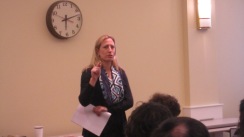
Micro-finance is an increasingly popular development approach, particularly in developing countries, that provides an appropriate range of high quality finance services, including savings, insurances, and fund transfers, to low-income or poor individuals. Additionally, micro-financing helps promote gender equality, which allows women to have more active roles in both society and their families.
In her presentation, Eurkus from Accion talked about Accion’s micro-financing projects which support low-income people. Accion has 63 institutions in 31 countries helping 13 million people. She showed a video starring two women helped by Accion; one was able to start up her own jewelry making business and another who now runs her own restaurant.

Shire first showed a tear-inducing promotional video from UNICEF, and then went on to discuss specifically UNICEF’s Communal Banking project in Bolivia. Her project helps train women from rural areas in finance and operations. This approach stressed the importance of business planning, continued education and also provides complementary educational courses on hygiene, sanitation, and environmental awareness.
The question and answer period following the presentation showed the varied interests of the attendees; with questions ranging from education, to financial particulars and of course the social impact of micro-financing on women across the globe. Accion and UNICEF stressed their differences (success in the city vs rural etc) but also showed how very similar they are and how important their work is.
The event was a great success with over 40 attendees and a lengthy networking reception afterwards. Check out more pictures of the event on our Facebook page!!!

Please join us in our upcoming events. We have more exciting plans in the works!!
Help Starts Young
Here’s another post for our Get Educated, One Topic At A Time blog series! This week you can learn about Child Poverty throughout the world and the efforts being made to help the fight against child poverty and child labor so that future generations can develop. You can also check out our past blog posts to learn about more global topics: “A Historical Moment For Genocide”, “Two Sides To Invest”, “An Undefined Grasp Of Failure”, “A Necessary Priority”, “A Reform For The World” and “The Rural Challenge”. Check back next Monday for another blog post!
 About 45 % of children in Latin America and the Caribbean live in a state of poverty.
About 45 % of children in Latin America and the Caribbean live in a state of poverty.

his means that child poverty affects nearly 81 million children and adolescents in these regions of the world! As defined by the UN General Assembly in 2007, child poverty is “the deprivation of nutrition, water and sanitation facilities, access to basic health-care services, shelter, education, participation, and protection”. Nutrition is immensely important in a child’s life for lack of it can cause damage in early childhood and have harmful long-term effects on the child’s health. Despite this, about 30 million children are born each year with impaired growth due to poor nutrition. Possible solutions to unhealthy diets include proper education on healthy eating habits and income support (healthy food tends to cost more than unhealthy substitutes).
 Education, including that learned in school and from one’s social interactions and environment, can be a means of escaping poverty because it improves the chances that the child will have a good income and be able to afford the necessities denied him/her by poverty. Unfortunately, a child’s ability to receive a quality education is largely based on the family’s finances, seeing as how an education costs money. Sadly, a family’s low financial status increases the chances of the child being forced into child labor so as to help support the family and himself/herself. While working as a child can make school for the individual possible (working for the money that will fund their education), child labor can also be a means of a child getting stuck in poverty by hurting the child’s health or keeping him/her tied down by low-skilled work. However, child labor that offers the child the ability of a formal education or out of poverty and is not dangerous to the child is not the worst option. As a country, it is important to determine the nature of the child labor before completely banning what may, in fact, be helping.
Education, including that learned in school and from one’s social interactions and environment, can be a means of escaping poverty because it improves the chances that the child will have a good income and be able to afford the necessities denied him/her by poverty. Unfortunately, a child’s ability to receive a quality education is largely based on the family’s finances, seeing as how an education costs money. Sadly, a family’s low financial status increases the chances of the child being forced into child labor so as to help support the family and himself/herself. While working as a child can make school for the individual possible (working for the money that will fund their education), child labor can also be a means of a child getting stuck in poverty by hurting the child’s health or keeping him/her tied down by low-skilled work. However, child labor that offers the child the ability of a formal education or out of poverty and is not dangerous to the child is not the worst option. As a country, it is important to determine the nature of the child labor before completely banning what may, in fact, be helping.
A range of factors contributes to child poverty. An example of such are the natural disasters that constantly plague the Caribbean, leaving the countries in disrepair and economic strife. The fact that children are not represented in policies to the same extent as adults also allows child poverty to prevail because they are not being protected by laws or governments. Despite the various contributors to child poverty, one theory remains quite evident: the failure to effectively end child poverty in Latin America and the Caribbean produces a cycle of hardship that passes on to generations while further limiting the future opportunities for these children.

United Nations milestones such as the Convention on the Rights of the Child (adopted in 1989) and the establishment of the United Nation’s Children’s Fund (UNICEF) in 1946 have made great strides to dealing with and eventually ending child poverty. Defined by UNICEF, the Convention is “an international treaty that recognizes the human rights of children, defined as persons up to the age of 18 years old”. The Committee on the Rights of the Child ensures that countries are working towards “ensuring that all children have access to education and healthcare, the ability to reach their potential and abilities, grow up in a positive environment of love and happiness, and benefit from protection and assistance”. UNICEF has participated in much humanitarian work aimed at child poverty and works through TACRO (UNICEF’s regional office for the Americas and the Caribbean) to support and work with other organizations like the World Food Programme and the World Health Organization in order to advocate for good nutrition practices in Latin America and the Caribbean. Overall, although child poverty remains an issue of international affairs, the UN and its organizations continue to work towards the cease of this epidemic.
-Amanda
A World of Changes: Week of 7/11 News Roundup
This week brought so many changes. To start, last weekend Southern Sudan declared its independence followed by being admitted into the UN as the 193rd member this week.
The world along with the UN supports the new member state as the nation’s flag waves outside the UN Headquarters in NYC. Along with excitement for the potential of this new nation, comes concern for the challenges it will face as a new nation in the world.
With the welcoming of a new nation, this week was also faced with unfortunate attacks in another world’s nation. There was an attack in the city of Mumbai, India, killing 21 and injuring 141 people. The UN’s Security-General Ban Ki-moon stays concerned that these attacks go against our world strive towards goals towards global peace and global security.
 The UN’s Secretary-General Ban Ki-moon continues to hope for positive progression in the world, in his support of Doha Documents for Peace in Darfur signed by the Sudanese Government and Liberation and Justice Movement. This agreement will work towards stopping the violence that 300,000 people have lost their lives to in the 8 years of violence.
The UN’s Secretary-General Ban Ki-moon continues to hope for positive progression in the world, in his support of Doha Documents for Peace in Darfur signed by the Sudanese Government and Liberation and Justice Movement. This agreement will work towards stopping the violence that 300,000 people have lost their lives to in the 8 years of violence.
 As the world faces many challenges, good news came this week to cure diseases and save lives around the world specifically for the fight against HIV/AIDS. Medicines Patent Pool and Gilead Sciences participated in an agreement that would give people in developing countries the opportunity to have medicine to fight against the disease. Antiretroviral medicine has also been recognized this week as having the potential to save lives by acting as protection against the disease for those not exposed to it. This gives people in environments that the disease is a caution the opportunity to stay protected. With all of these great advances for HIV/AIDS, the Bill & Melinda Gates Foundation also has agreed to donate $1 million dollars to support new ideas towards the fight against HIV/AIDS as well malaria. These new advances this week in the medical world give hope to the potential of reaching the MDG #6 as we continue to get closer and closer to the 2015 goal.
As the world faces many challenges, good news came this week to cure diseases and save lives around the world specifically for the fight against HIV/AIDS. Medicines Patent Pool and Gilead Sciences participated in an agreement that would give people in developing countries the opportunity to have medicine to fight against the disease. Antiretroviral medicine has also been recognized this week as having the potential to save lives by acting as protection against the disease for those not exposed to it. This gives people in environments that the disease is a caution the opportunity to stay protected. With all of these great advances for HIV/AIDS, the Bill & Melinda Gates Foundation also has agreed to donate $1 million dollars to support new ideas towards the fight against HIV/AIDS as well malaria. These new advances this week in the medical world give hope to the potential of reaching the MDG #6 as we continue to get closer and closer to the 2015 goal.
Stay involved with our world news as well hope for good change and progression in our global future.
-Cara
A UNited response to Japan Earthquake
 Five days after an 8.9-magnitude earthquake and tsunami struck Japan’s north-east coast at 2:46 p.m. local time, the official death toll is now more than 4,300. More than 8,000 people are still missing, and half a million are homeless. Hundreds of national and international rescue teams are leading the relief effort.
Five days after an 8.9-magnitude earthquake and tsunami struck Japan’s north-east coast at 2:46 p.m. local time, the official death toll is now more than 4,300. More than 8,000 people are still missing, and half a million are homeless. Hundreds of national and international rescue teams are leading the relief effort.
Friday’s earthquake in Japan was the country’s strongest recorded quake. It hit north-east of the main island of Honshu; its epicenter was undersea, about 400 kilometers northeast of the Japanese capital, Tokyo. The quake triggered a powerful subsequent tsunami that inundated towns, villages and farmlands along the coast and devastated dozens of coastal communities. The devastation is of such magnitude that it is hard to imagine some of the communities ever being rebuilt. Town after town has been wiped away.

Source: freshnessmag.com
Now, Japan is facing another frightening reality — the possibility of a radioactive leak stemming from a second reactor at the Fukushima Dai-Ichi plant. Since the earthquake knocked out the plant’s cooling systems over the weekend, the crisis at the Fukushima plant has mounted. The first three reactors have already exploded due to build up of hydrogen gases. The repeated releases of different amounts of radiation — some large, some small — are cause for concern. (For the latest news and updates, check here).
 Secretary-General Ban Ki-moon voiced his sorrow on Friday: “I want to express my deepest sympathies and heartfelt condolences to the Japanese people and Government, and most especially to those who lost family and friends in the earthquake and subsequent tsunami…” Mr. Ban said the UN would do all it could to mobilize humanitarian assistance and disaster risk reduction teams as soon as possible.
Secretary-General Ban Ki-moon voiced his sorrow on Friday: “I want to express my deepest sympathies and heartfelt condolences to the Japanese people and Government, and most especially to those who lost family and friends in the earthquake and subsequent tsunami…” Mr. Ban said the UN would do all it could to mobilize humanitarian assistance and disaster risk reduction teams as soon as possible.
A United Nations disaster team arrived in Japan two days ago, and local officials have asked the world body to dispatch a team of nuclear safety experts as emergency operations continue in the wake of Friday’s catastrophic earthquake and tsunami. The United Nations has also called an emergency meeting to discuss possible solutions to Japan’s deepening nuclear crisis.
According to the UN, a seven-member UN Disaster Assessment and Coordination (UNDAC) team will set up an on-site operations center to help Japanese authorities disseminate accurate and timely information on the disaster and the emergency efforts. The team of specialists will travel to affected areas in the days ahead to assess the humanitarian needs, according to the UN Office for the Coordination of Humanitarian Affairs (OCHA). They will also assist the Japanese Government in providing advice on incoming international relief goods and services.
 Even though Boston is close to 7,000 miles away from Japan, there are ways for YOU to help the victims of the earthquake and tsunami. Please consider making a donation through UNICEF, The World Food Programme, or The UN Foundation. Every contribution can help make a difference. Consider donating today and please stay tuned for additional ways to get involved as the relief efforts develop!
Even though Boston is close to 7,000 miles away from Japan, there are ways for YOU to help the victims of the earthquake and tsunami. Please consider making a donation through UNICEF, The World Food Programme, or The UN Foundation. Every contribution can help make a difference. Consider donating today and please stay tuned for additional ways to get involved as the relief efforts develop!
-Hanna

International Year of Youth (IYY)
On December 18, 2009, the United Nations General Assembly proclaimed the International Year of Youth under the theme “Dialogue and Mutual Understanding” to begin on August 12, 2010 and to conclude on August 12, 2011. This year coincides with the 25th anniversary of the first International Year of Youth.
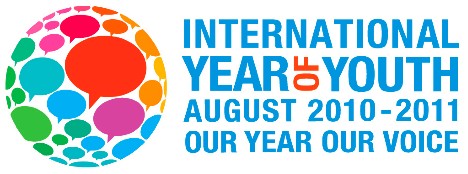 Representing 18% of the global population, youth between the ages of 15 to 24 are a vital part of today’s society and therefore “…we must do even more to reach out, to listen and to learn from young people” (Secretary-General Ban Ki-moon). This year, IYY provides youth with the opportunity to advocate for youth issues and to encourage dialogue among youth and across generations to promote the ideals of peace, respect for human rights and freedoms, and solidarity.
Representing 18% of the global population, youth between the ages of 15 to 24 are a vital part of today’s society and therefore “…we must do even more to reach out, to listen and to learn from young people” (Secretary-General Ban Ki-moon). This year, IYY provides youth with the opportunity to advocate for youth issues and to encourage dialogue among youth and across generations to promote the ideals of peace, respect for human rights and freedoms, and solidarity.
There are many celebratory events planned for the IYY across the world. The UN Conference on Youth will be a highlight for the year. Other events include an IYY Mega Summit in Nigeria and the 5th World Youth Congress in Turkey. Through such events in celebration of the International Year of Youth, the United Nations will focus on increasing commitment and investment in youth, increasing youth political participation and partnerships as well as boosting inter-cultural understanding among youth.
 To learn more about the International Year of the Youth visit http://social.un.org/youthyear/
To learn more about the International Year of the Youth visit http://social.un.org/youthyear/
-Christina
Fair Trade Panel for Young Professionals
“We are everlasting debtors to known and unknown men and women. We do not finish breakfast without being dependent on more than half of the world. When we arise in the morning, we go into the bathroom where we reach for a sponge which is provided for us by a Pacific Islander. We reach for soap that is created for us by a Frenchman. The towel is provided by a Turk. Then at the table we drink coffee which is provided for us by a South American, or tea by a Chinese, or cocoa by a West African. Before we leave for our jobs we are beholden to more than half the world.”
These are the words of Martin Luther King Jr in his book Strength to Love and were reiterated last week at the Fair Trade Panel for Young Professionals hosted by UNA-GB’s Young Professionals for International Cooperation (YPIC) and co-sponsored by Boston Faith and Justice Network. The panel included speakers from Boston Faith and Justice Network, Proxy Apparel, a sweatshop free apparel company and Autonomie Project, a fair trade apparel and footwear company.
Even more so than in Dr. King’s time, we are exposed to global products and processes in our everyday lives. Whether it is the food that travels thousands of miles to arrive at the local grocery store or the garments that are cut, sewed, dyed, embroidered, and packaged around the world before arriving at the nearest shopping mall, the everyday products we buy have global connections and can significantly affect producers’ lives.
Last week, the YPIC panel discussed how audience members can make more informed decisions as consumers that will improve the lives of the producers: buying sweatshop-free items and Fair Trade certified items, which may guarantee consumers that fair wages and labor conditions were involved with the production process.
In essence, your simple everyday purchases can help or discourage trade justice in the world and can mean food on the table for a farm worker’s family. The panelists made it clear that our purchases do have global consequences and it is up to us to demand Fair Trade products in the supermarket and in our shopping malls. One way to care is to provide only Fair Trade items in your place of work. This is a part of a greater movement by Fair Trade Boston to declare Boston a Fair Trade City in 2010.
A simple way I personally plan to be more proactive about my purchases by asking store managers where products are made, if the products are Fair Trade and whether the products were made in non-sweatshop conditions. Only if we take action can we make a difference to more just production practices.
The Impact of Fair Trade Apparel Video
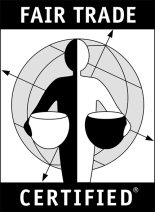
Christina
